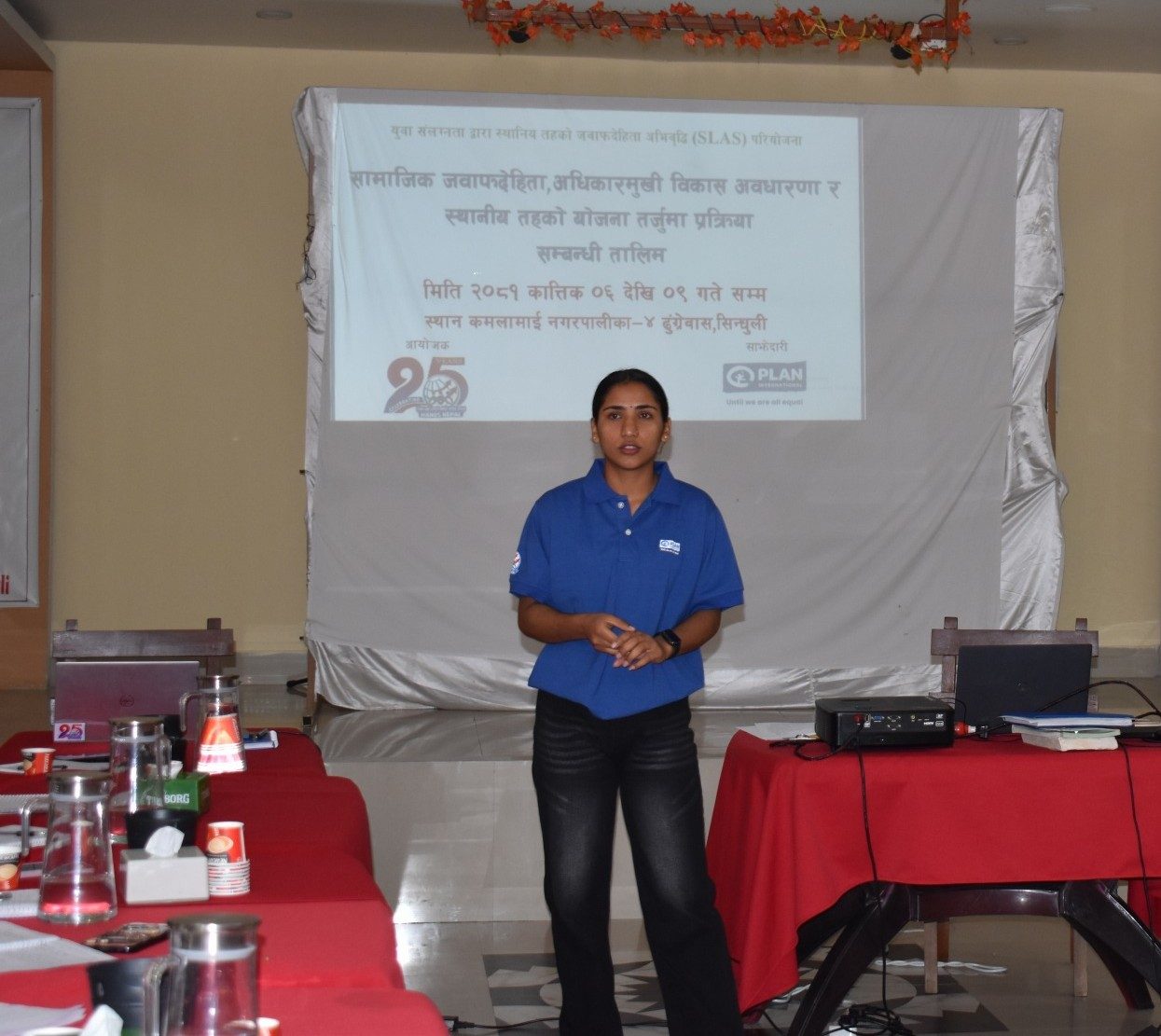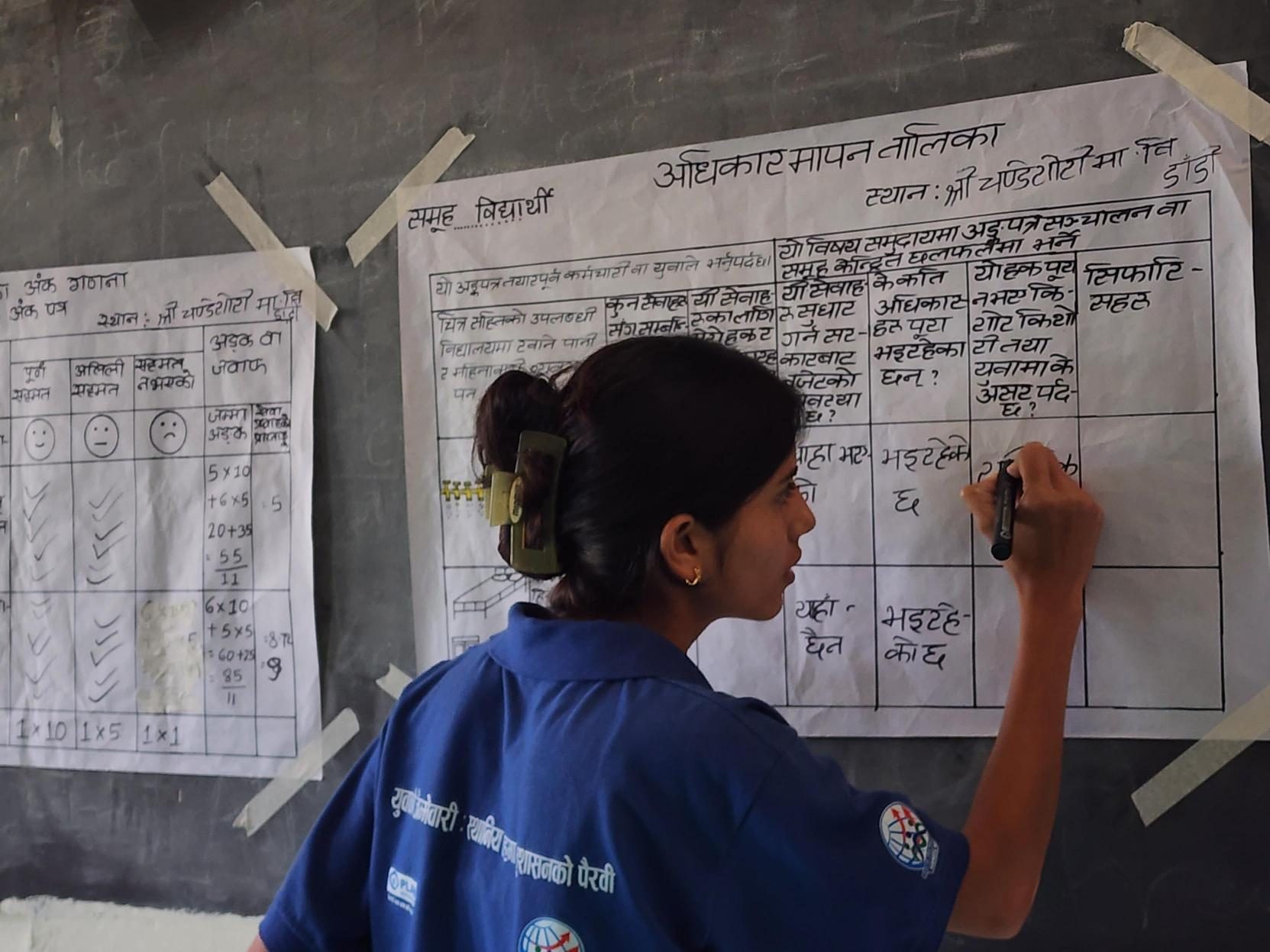Manisha is a community activist
Manisha, a 19-year-old from rural Nepal, is leading change in her community with courage and determination. From fixing school facilities to raising health issues, she is proving that young voices can drive accountability and inspire others to take action.

Manisha, 19, is a young woman from a rural village in Nepal. She lives with her parents, 2 married sisters, and her grandmother, while her brother studies abroad. Her father is a farmer, and her mother looks after the home. Manisha is the youngest in the family and is now in her first year of a Bachelor’s in Management.
At home, Manisha has many chores: cooking, fetching water, cleaning dishes, taking goats to graze, and cutting grass for them. She shares, “Our family’s income is low. My parents couldn’t afford to educate my sisters, so they were married off young. They wanted me to get married because they couldn’t afford my education.”
Change began when Manisha stepped forward as a youth volunteer with the Strengthening Local Accountability through Youth Engagement (SLAS) project, taking charge of her future and inspiring others to do the same. The small allowance she received from volunteering allowed her to pay her college fees.
“I don’t ask my parents for money anymore, so they don’t pressure me to leave college. They now believe I can do something for the family,” she says with a smile. Manisha dreams of becoming a government officer or a social worker. She is preparing for the government service exam while continuing her volunteer work. “I am happy with what I’m doing now. Volunteering has made me feel closer to my goals,” she says.
“Our family’s income is low. My parents couldn’t afford to educate my sisters, so they were married off young. They wanted me to get married because they couldn’t afford my education.”
Manisha, youth volunteer
A new path
Before joining SLAS, Manisha was shy and lacked confidence.“I couldn’t speak up in front of people or lead any programme,” she recalls. “But after joining SLAS, I have gained confidence. I can now speak in meetings, lead activities, and coordinate with different people.”
Manisha received training in leadership, facilitation, safeguarding, planning, and content creation. She began applying these skills in her community, working on real issues and finding solutions with others. “Before, I used to sit in Champion of Change classes and watch the seniors lead sessions. I wanted to be like them one day, confident and able to guide others.”
Manisha saw a youth volunteer as a perfect opportunity to grow. But her journey was not easy. In her community, girls are often discouraged from being active outside the home. “People said, ‘You are a girl, you should not roam around like this. You will spoil your character.’ Even my family doubted me. But I didn’t give up,” Manisha shares.

Speaking up for her community
Manisha used what she learned to help her family and neighbours understand the value of her work. They saw her engaging with schools, health posts, and ward offices, using the Youth Citizen Score Card (YCSC) – a tool that helps youth to assess the quality and responsiveness of public services – to promote accountability.
“They saw me working hard in the community, and slowly, they started to appreciate what I was doing,” she says.
Manisha and her friends started to identify problems in local schools and health posts, such as broken toilet locks, a lack of dustbins, and water shortages. They also noticed poor road conditions and the lack of ambulance services at the health post.
After identifying these issues, Manisha and her team organised meetings with local leaders to find solutions. As a result, dustbins were provided to schools, broken taps were fixed, and health services improved.
“When we raised these issues, the ward chairperson immediately arranged dustbins for the toilets. Seeing these changes made me feel proud,” she shares.
“When we raised these issues, the ward chairperson immediately arranged dustbins for the toilets. Seeing these changes made me feel proud.”
Manisha, Youth volunteer
She is also happy that, under the Chief Minister’s Programme, regular health check-ups are now held for people over 30, including blood pressure and sugar checks. Manisha has also learned to write news stories to highlight problems in her community.
“Before, I didn’t know how to write news. Now, I can turn problems into stories and share them with the media,” she explains.
She has built strong friendships.“Some of the friends I made during SLAS feel like family now. We share what we learn, and we help each other grow,” she says. Manisha is also working to bring change at home.
“My grandmother used to discriminate against me during menstruation. I explained to her about menstruation and why the taboos are harmful. Now, I can see some changes in her behaviour,” Manisha says proudly.
A message from Manisha
Manisha shares, “One of my proudest moments was using the Youth Innovation Fund to bring other young people together in campaigns to prevent child marriage and promote education.”
“The community had many expectations, and it wasn’t always easy. But my friends and I worked hard to help them understand that we can bring change together,” she says. Her parents now believe in her dreams and hope she will achieve something great.
Manisha has a message for other young people: “Just because your family is poor or under pressure doesn’t mean you should choose child marriage. Keep studying, keep trying, and don’t give up. Change happens when we don’t stop trying.”
“One of my proudest moments was using the Youth Innovation Fund to bring other young people together in campaigns to prevent child marriage and promote education.”
Manisha, Youth Volunteer
About YCSC and SLAS
YCSC tool empowers youth to actively participate in local governance by assessing the quality and responsiveness of public services. Through this innovative tool, young people identify gaps and provide feedback on essential services like education, health, and sanitation. By engaging with local authorities and community leaders, the YCSC promotes transparency, accountability, and inclusive decision-making, ensuring that youth voices directly influence policies and service delivery in their communities.
The SLAS project focuses on building young people’s capacity to hold local governments accountable and advocate for their rights. It encourages youth to take leadership roles, engage in policy dialogues, and collaborate with authorities to address pressing community issues. By fostering youth empowerment and civic participation, SLAS contributes to creating more responsive and gender-equal local governance systems that reflect the priorities and needs of all community members.


